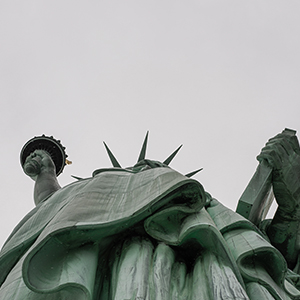Osborn v Bank of the United States Clarifies Reach of Federal Jurisdiction
Historical
In Osborn v Bank of the United States, 22 US. (9 Wheat.) 738 (1824), the U.S. Supreme Court addressed Article III’s grant of judicial power over cases “arising under” federal law. In his opinion, Chief Justice John Marshall broadly interpreted the power of Congress to confer jurisdiction to the federal courts.
The Facts of Osborn v Bank of the United States
In violation of the Supreme Court’s prior decision in McCulloch v. Maryland, 17 U.S. (4 Wheat.) 316 (1819), which held that the states may not tax national banks, Ohio imposed a state tax on the Bank of the United States. The Bank sought a temporary injunction in a federal circuit court to prevent Ohio’s state auditor from collecting. Although the court granted the injunction, the Ohio auditor, Ralph Osborn, ignored the order and seized $120,475 from the Bank by force. The circuit court ordered the state officials to return the money. They appealed to the United States Supreme Court, arguing that the federal court lacked jurisdiction over the suit.
Article III of the Constitution states: “The judicial power shall extend to all cases, in law and equity, arising under this Constitution, the laws of the United States, and treaties made, or which shall be made, under their authority.”
The Court’s Decision in Osborn v Bank of the United States
By a vote of 6-1, the Supreme Court upheld the circuit court’s ruling. “A State cannot tax the Bank of the United States, and any attempt on the part of its agents and officers to enforce the collection of such tax against the property of the Bank may be restrained by injunction from the circuit court,” Chief Justice John Marshall wrote.
With regard to whether the circuit court had jurisdiction over the suit, the Court broadly interpreted Congressional power to confer jurisdiction. It found there was nothing in the Constitution to prevent Congress from giving inferior courts original jurisdiction over matters to which the Supreme Court’s appellate jurisdiction extends.
Further observations from the Court in Osborn v Bank of the United States
The Court further held that a case arises under federal law for the purposed of Article III whenever federal law “forms an ingredient of an original cause.” As the Chief Justice further explained:
We think, then that when a question to which the judicial power of the Union is extended by the Constitution forms an ingredient of the original cause, it is in the power of Congress to give the circuit courts jurisdiction of that cause, although other questions of fact or of law may be involved in it.
The Court also addressed the sovereign immunity protections of the Eleventh Amendment. It held that Eleventh Amendment only applies to suits in which the state is a named party. Although Osborn was acting in his official capacity, the Court held that he was not entitled to immunity from suit.
Previous Articles
SCOTUS Decision in Bowe v. United States Is First of the 2026 Term
by DONALD SCARINCI on February 5, 2026
In Bowe v. United States, 607 U.S. ___ (2026), the U.S. Supreme Court held that Title 28 U.S.C. § ...
SCOTUS Rules State Can’t Immunize Parties from Federal Civil Liability
by DONALD SCARINCI on January 29, 2026
In John Doe v. Dynamic Physical Therapy, LLC, 607 U.S. ____ (2025) the U.S. Supreme Court held that...
Supreme Court to Address Racial Discrimination in Jury Selection
by DONALD SCARINCI onWhile the U.S. Supreme Court has concluded oral arguments for the year, it continues to add cases t...
The Amendments
-
Amendment1
- Establishment ClauseFree Exercise Clause
- Freedom of Speech
- Freedoms of Press
- Freedom of Assembly, and Petitition
-
Amendment2
- The Right to Bear Arms
-
Amendment4
- Unreasonable Searches and Seizures
-
Amendment5
- Due Process
- Eminent Domain
- Rights of Criminal Defendants
Preamble to the Bill of Rights
Congress of the United States begun and held at the City of New-York, on Wednesday the fourth of March, one thousand seven hundred and eighty nine.
THE Conventions of a number of the States, having at the time of their adopting the Constitution, expressed a desire, in order to prevent misconstruction or abuse of its powers, that further declaratory and restrictive clauses should be added: And as extending the ground of public confidence in the Government, will best ensure the beneficent ends of its institution.





